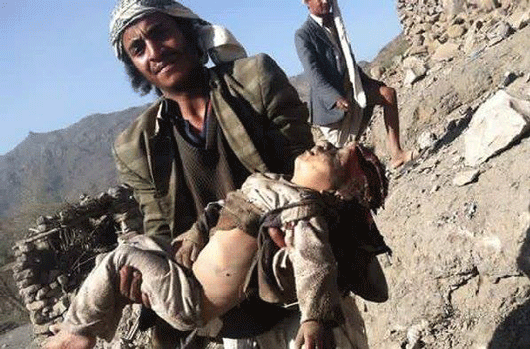
"Nearly one-third of all civilian casualties are children," noted AntiMedia’s Claire Bernish in her analysis of the report.
In a Mar. 25 investigation of the conflict by Foreign Policy, Rasha Mohamed and Rawan Shaif reported that, one year into the conflict, "it still remains unclear who is winning the war" but what is clear is that "wanton disregard for the lives of civilians continues unabated."
Despite the body count, the United States, England and France continue to supply arms to the Gulf Kingdom.
"Since November 2013, the U.S. Defense Department has authorized more than $35.7 billion in major arms deals to Saudi Arabia. This includes the announcement of a $1.29 billion U.S. arms sale to Saudi Arabia in November 2015 that will supply Riyadh with 18,440 bombs and 1,500 warheads," Mohamed and Shaif reported.
The U.K., meanwhile, provided, "$9 billion worth of weaponry to Saudi Arabia, including nearly $4 billion since airstrikes on Yemen began, according to the Campaign Against Arms Trade, a London-based NGO."
Opposition to the attacks began almost immediately after the Saudi-led bombing campaign began, with thousands taking the streets in Sanaa last April. Human rights groups soon joined the outcry, ranging from Amnesty International to regional groups like Mona Relief Organization, an NGO based in Yemen.
Yemen is a veritable humanitarian black hole. I have witnessed firsthand the destruction and the despair civilians have been put through under al-Saud’s draconian siege," the organization’s director, Dr. Riaz Karim, told Catherine Shakdam in a March 30 MintPress News’ analysis.
"By continuing to sell weapons to a known violator that has done little to curtail its abuses, the US, UK, and France risk being complicit in unlawful civilian deaths," warned Philippe Bolopion in a Mar. 21 press release.
Shakdam’s analysis revealed that, in addition to profit for the military-industrial complex, Saudi Arabia’s energy interests are behind the conflict.
"Yemen was literally set on fire so Riyadh could manifest its long-held ambition of an oil monopoly," she wrote. The region offers control over the Bab-el-Mandeb strait, a key oil route, and the country is the proposed site of the U.S.-backed Hadramawt pipeline.
An analysis by Vanessa Beeley, an independent Middle East journalist writing for 21st Century Wire, suggests the United Nations is also complicit in the bloodshed through an arms embargo approved by the U.N. Security Council, which she argued provides tacit approval for the war. Far from acting out of humanitarian aims, "[t]he UN is, in reality, actively allowing the denial of human rights to the Yemeni people by the predatory aggressor, Saudi Arabia," she wrote.
"It is almost impossible not to conclude that multiple parties are colluding to starve Yemen into submission to Saudi objectives," she concluded, including the U.S. and its NATO allies.
Source: Mint Press News, Edited by Website Team